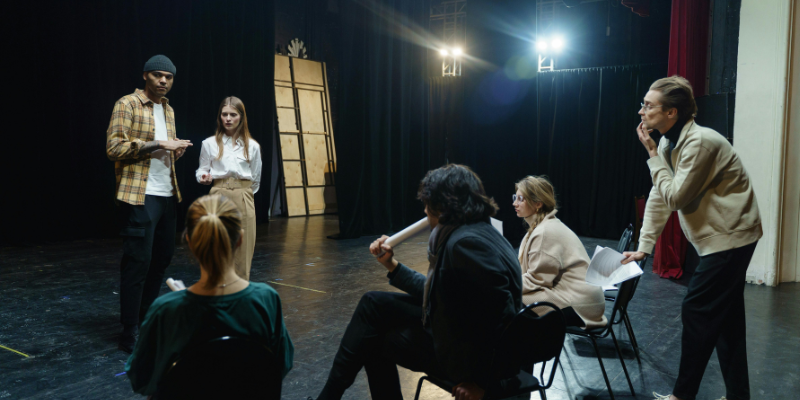10 Ways Improv and Positive Psychology Are Alike
A Positive Psychologist Takes an Improv Class
For the past fifteen years, I’ve been immersed in the day-to-day activities of a positive psychologist. Every day, I’m writing, teaching, and doing healing work around positive psychology principles. In this work, I’m ever looking for the most efficient way to positively change individuals, couples, groups, organizations, and communities. But I’ve just stumbled into what might be one of the most direct, fun, and impactful ways to cultivate positivity—an improv class.
I completed my first eight-week improv course at the famed and fabulous People’s Improv Theater (PIT) in NYC with master improv teacher Kim Alu. The PIT has been home to many improv students, including alumni Lin Manuel Miranda, the Pulitzer Prize and Tony Award winner known for his Broadway musicals In the Heights and Hamilton, and his improv show on Broadway Freestyle Love Supreme; Êllie Kemper, best known for her role of Erin Hannon on The Office; and stand-up comedian, writer and producer, Hannibal Amir, Buress. The class was extraordinary. It was eight weeks of pure fun, learning the rules of improv, laughing hard and often, and developing skills for performance.
Andrea, my scene (and life) partner, bought us the classes as a birthday gift. It was the best couple’s gift ever. If you are a couple looking for a fun night out, improv classes are a great option.
But I’m writing this blog article for more than promoting improv as a date night. I am writing it because the rules of comedic improv are quite parallel to the tenets of positive psychology and living a more joyful, engaged, and thriving life.
How to say “Yes, and…” in improv and in life
Saying "Yes, and…" is the foundational principle of improv. It encourages acceptance and building on ideas, like how open-mindedness can enhance our interactions and life experiences. As you might expect, flexibility and adaptability are at the very heart of improv. Improv teaches the importance of adaptability, a crucial skill for navigating life's ever-changing landscape. It also emphasizes the process of creation rather than perfection, reminding us to enjoy the journey rather than just the destination.
Over the eight weeks, Kim taught the class how to apply these “rules” in scene work together. As the weeks unfolded, I realized how much improv is a rehearsal for life.
10 Lessons from Improv Class—That Are Positive Psychologist Approved
Here are my top 10 takeaways from the class (that map onto positive psychology principles quite well):
1. Embracing the Unexpected
Just as improv relies on spontaneity and unexpected twists, life often throws surprises that require us to adapt and respond in real time.
2. Collaboration is Key
In improv, success comes from working with others, much like in life, where teamwork and collaboration are essential for achieving common goals.
3. Active Listening
Improv emphasizes listening to your scene partners to build a cohesive story. Similarly, effective communication requires us to listen and truly understand others.
4. Letting Go of Perfection
Improv teaches that mistakes are integral to the process, mirroring life’s reality that perfection is unattainable and that we learn from our failures.
5. Building Confidence
Both improv and life involve stepping out of your comfort zone. Taking risks in a safe environment, like an improv class, helps build the confidence needed to face challenges in life.
6. Staying Present
Improv requires participants to be fully present in the moment, which is a valuable life skill that helps us appreciate our experiences and respond authentically.
7. Creating Opportunities
Improv is about seizing the moment and making the most of what’s presented, just as life offers us numerous opportunities if we remain open and proactive.
8. Taking Risks
Improv encourages stepping outside of your comfort zone, just as taking calculated risks in life can lead to growth and new experiences.
9. Expressing Emotions
Improv allows for exploring and expressing a range of emotions, reflecting how acknowledging and expressing feelings is vital in life.
10. Building Community
Improv fosters a sense of belonging and support among participants, reflecting how strong relationships and community are vital to a fulfilling life.
These parallels illustrate how the skills and lessons learned in improv can translate powerfully into our everyday lives. Improv teaches not only to bounce back from failures but to bounce forward when overcoming life’s obstacles.
There is likely to be an improv class nearby where you live. Andrea and I have already signed up for our next class. I highly recommend it for individuals, couples, organizations, and corporate training. If you are lucky enough to be in and around New York City, you can always drop by or get more information from the PIT.
Maybe we’ll see you in class.


